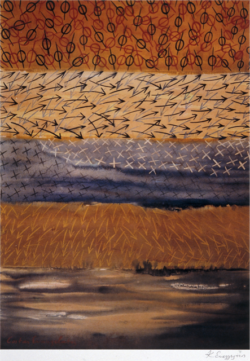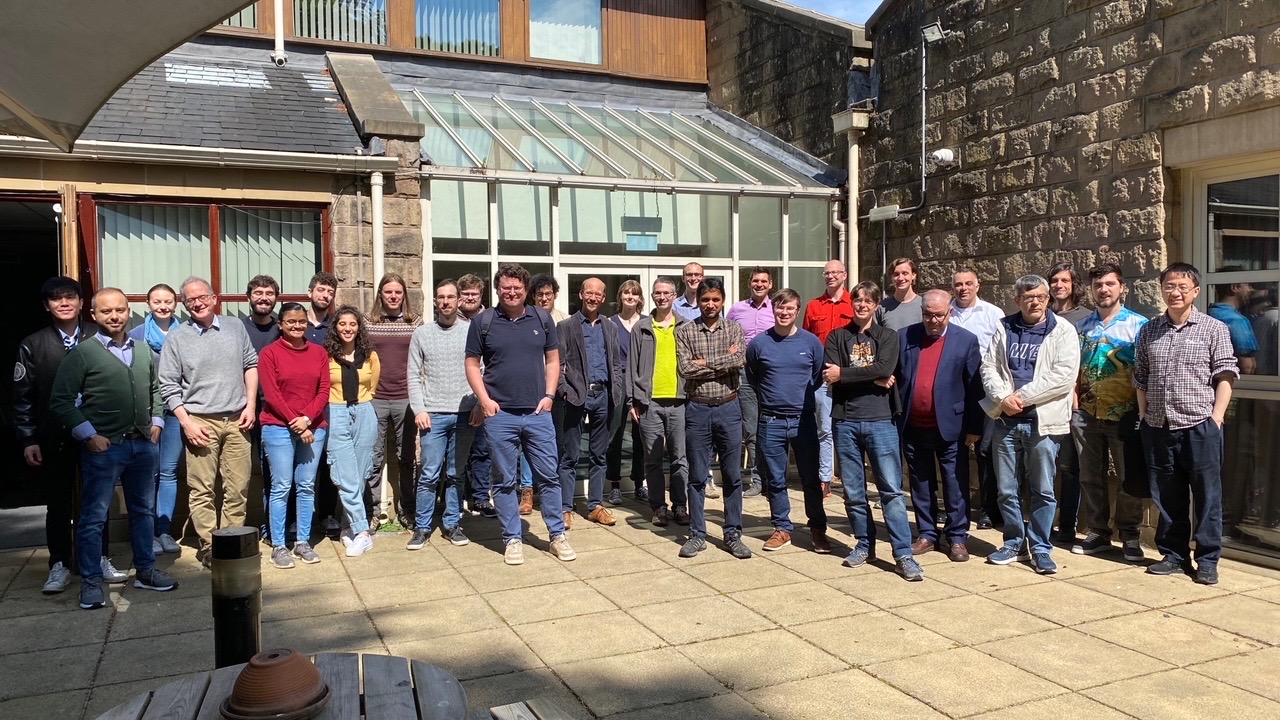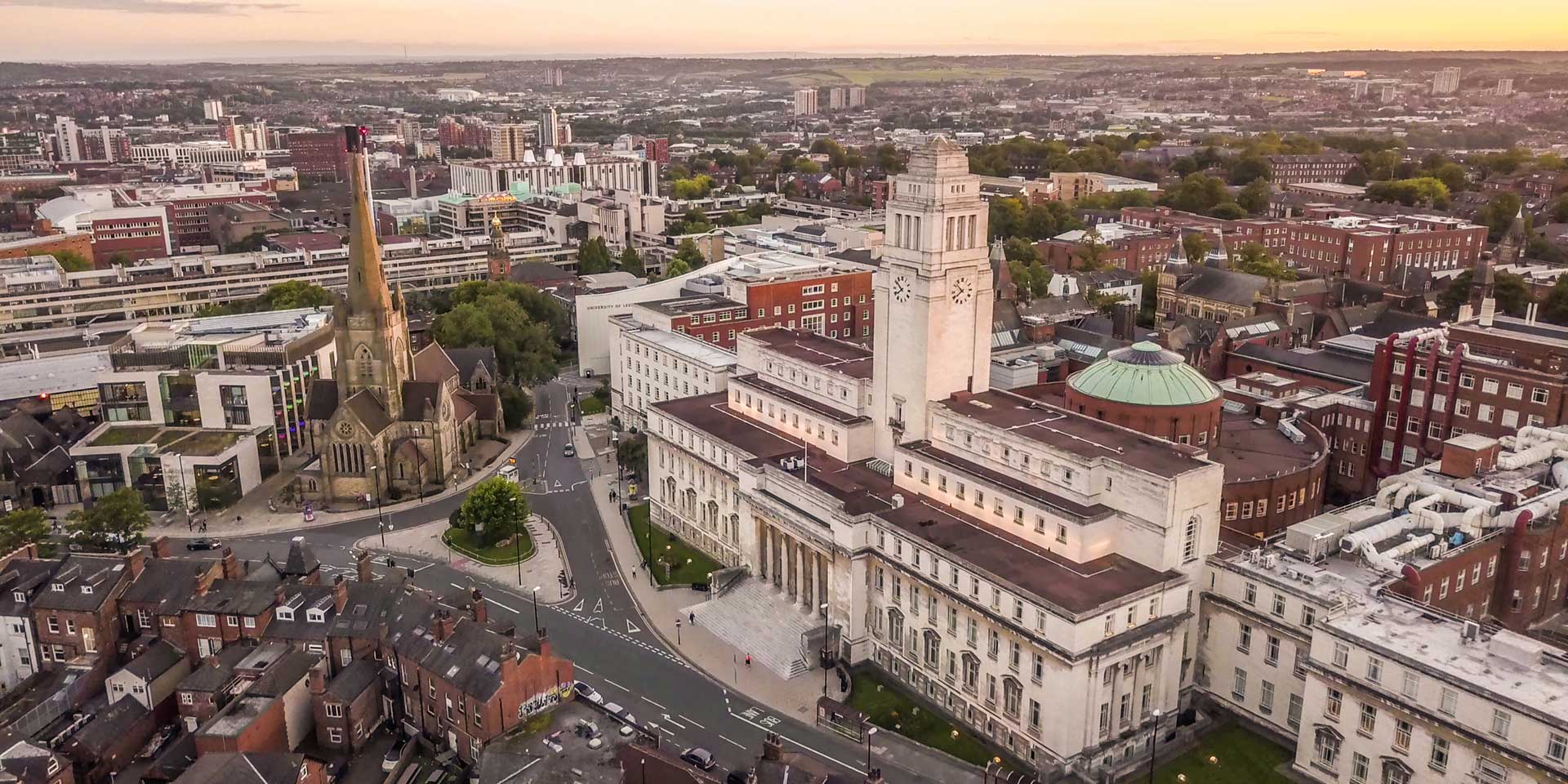24th Symposium on Quantum Matter and High-Energy Physics

Artwork by Costas Evangelatos
We are delighted to organise a Symposium on 6-8th June 2022 as part of a long-running tradition founded by prof. J.K. Pachos. This edition is focused on the interplay between quantum matter and high-energy physics. The Symposia create an active environment for open discussion as well as encourage new collaborations.
Finding the effective description of quantum matter in terms of quantum field theories and geometric models provides an elegant way to understand their properties and predict their universal behaviour. Within the general formalism of gravity several quantum systems such as Dirac materials, Hofstadter models, fractional quantum Hall states, etc., admit a geometric description in their low energy sector.
Moreover, ideas and methods inspired by quantum matter, such as geometric phases, entanglement and decoherence have been recently applied to gravity.
The Symposium will bring together experts in the fields of high energy physics, quantum information and condensed matter with the aim to investigate various bridges between these fields of research.
Registration
To register to attend please send an email to Matthew Horner: py13mh@leeds.ac.uk.
Participants
- Ajit Balram (Institute of Mathematical Sciences, Chennai)
- Benjamin Beri (University of Cambridge)
- Joe Bhaseen (King's College, London)
- Matthew Buican (Queen Mary)
- Paul Fendley (Oxford)
- Jelle Hartong (University of Edinburgh)
- Christopher Herzog (King's College, London)
- Sanjeev Kumar (University College London)
- Gunnar Moller (University of Kent)
- Giandomenico Palumbo (DIAS)
- Jonathan Pritchard (University of Strathclyde)
- Ulrich Schneider (University of Cambridge)
- Songyang Pu (University of Leeds)
- Mikael Fremling (Utrecht University)
- Alessio Serafini (UCL)
- Agapitos Hatzinikitas (University of Samos)
- Matthew Horner (University of Leeds)
- Kieran Bull (University of Leeds)
- Aydin Deger (University of Loughborough)
- Konstantinos Meichanetzidis (Cambridge Quantum Computing)
- Chris Self (Cambridge Quantum Computing)
- Joao Faria Martins (University of Leeds)
- Martin Speight (University of Leeds)
- Agapitos Hatzinikitas (University of Samos)
- Asmae Benhemou (UCL)
- Andrew Hallam (University of Leeds)
- Ana Hudomal (University of Leeds)
- Lucy Byles (University of Leeds)
- Gabriel Matos (University of Leeds)
- Aiden Daniel (University of Leeds)
- Ewan Forbes (University of Leeds)
- Jean-Yves Desaules (University of Leeds)
- Zlatko Papic (University of Leeds)
- Jiannis Pachos (University of Leeds)
- Lucia Hackermuller (University of Nottingham)
- Nathan Cooper (University of Nottingham)
- Sridevi Kuriyattil (University of Strathclyde)
- Robert Purdy (University of Leeds)
- David Jennings (University of Leeds)
- Daniel Hodgson (University of Leeds)
- Basil Altaie (University of Leeds)
- Samuel Fedida (UCL)
- Ayham Yousif (University of Leeds)
- Emma Heley (University of Leeds)
- Gabriel Waite (University of Leeds)
- Henry Mullineaux-Sanders (University of Leeds)
Programme
6th June:
- 10:00-11:00: Reception
- 11:00-12:00: Ajit Balram, "Very-High-Energy Collective States of Partons in Fractional Quantum Hall Liquids"
- 12:00-12:30 Songyang Pu, "Anderson Localization in the Fractional Quantum Hall Effect"
- 12:30-14:00: Lunch
- 14:00-15:00: Sanjeev Kumar, "Interacting electrons in one-dimension"
- 15:00-16:00: Gunnar Moller, "Spacetime Engineering with Tilted Dirac or Weyl Materials"
- 16:00-16:30: Tea
- 16:30-17:30: Giandomenico Palumbo, "Non-Abelian and tensor gauge fields in topological phases of matter"
- 17:30-18:00: Aydin Deger, "Arresting many body chaos with kinetic constraints in the classical floquet Heisenberg model"
- 18:00-18:30: Kieran Bull, "Realizing Fractional-Quantum-Hall Gravitons on Quantum Computers"
- 18:30-20:00: Dinner
- 20:00-: Social event
7th June:
- 10:00-11:00: Jonathan Pritchard, "Scalable Qubit Arrays for Quantum Computation and Simulation"
- 11:00-11:30: Tea
- 11:30-12:30: Ulrich Schneider, "Realizing discontinuous quantum phase transitions in optical lattices"
- 12:30-14:00 Lunch
- 14:00-14:30: Matthew Horner, "Black hole simulation in 1D spin chains"
- 14:30-15:00: Alessio Serafini, "Entanglement in QED interactions"
- 15:00-16:00: Joe Bhaseen, "Topological Markers in and out of Equilibrium"
- 16:00-16:30: Tea
- 16:30-17:30: Benjamin Beri, "Majorana zero modes for SYK and for classically compressed quantum computing"
- 17:30-18:00: Martin Speight, "Exotic magnetic structures in multicomponent superconductors"
- 18:00-18:30: Mikael Fremling, "Simulating the SYK model in strained iridate compounds"
- 18:30-20:00: Dinner
- 20:00-21:00: Paul Fendley, Duality, "Symmetry", and Topological Defects
8th June:
- 09:00-10:00: Jelle Hartong, "Fracton gauge theories and their coupling to curved spacetime"
- 10:00-11:00: Christopher Herzog, "Conformal surface defects in Maxwell theory are trivial"
- 11:00-11:30: Tea
- 11:30-12:30: Matthew Buican, "Quantum Codes, CFTs, and Defects"
- 12:30-14:00: Lunch
- 14:00-14:30: Joao Faria Martins, TBC
- 14:30-15:00: Nathan Cooper, "Experimental production of high-mass quantum systems using cold atoms"
- 15:00-15:30: Kon Meichanetzidis/Chris Self (joint talk), The Jones polynomial, ZX-calculus, and quantum circuits
- 15:30-16:00: Closing of the conference + Tea
Venue
The symposium will take place at Weetwood Hall, Conference Centre & Hotel in Leeds.


Organisers
Matthew Horner
Dr. Andrew Hallam
Dr. Songyang Pu
Dr. Zlatko Papic
Prof. Jiannis K. Pachos



